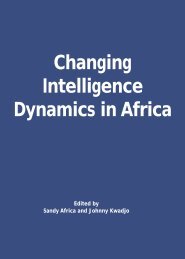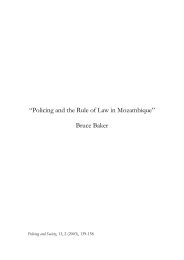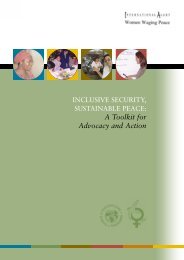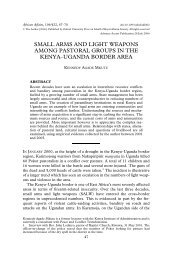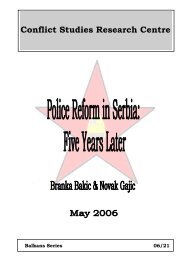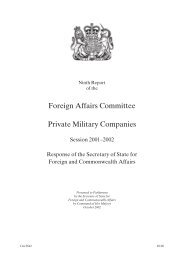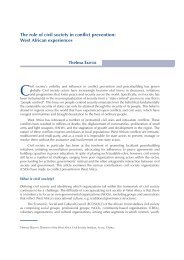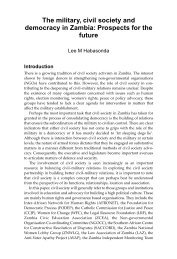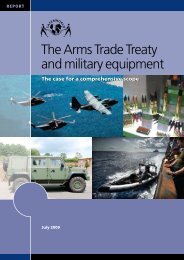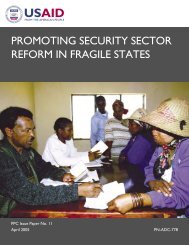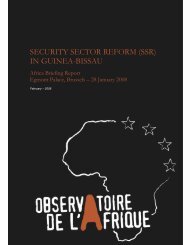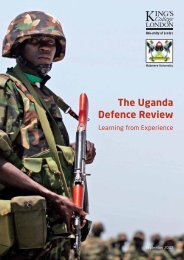AFGHANISTAN'S ELECTION CHALLENGES
AFGHANISTAN'S ELECTION CHALLENGES
AFGHANISTAN'S ELECTION CHALLENGES
You also want an ePaper? Increase the reach of your titles
YUMPU automatically turns print PDFs into web optimized ePapers that Google loves.
Afghanistan’s Election Challenges<br />
Crisis Group Asia Report N°171, 24 June 2009 Page 16<br />
participation in public life has seen no female election<br />
staff and no female election observers thus far in 2009.<br />
In the 2005 parliamentary polls, 90,000 of the 166,000<br />
new voter cards were issued in women’s names with<br />
female turnout during that year’s poll so unbelievably<br />
high that it has never been publicly released – the<br />
only province for which such a breakdown has not<br />
been provided. Despite this history, no additional action<br />
has been taken to tighten safeguards against this type<br />
of fraud, which requires the complicity of local election<br />
staff. In the 2009 voter update exercise, for instance,<br />
it was reported that 44,000 women had registered, just<br />
under the number of men at 45,000, in Paktika. The<br />
main domestic observer body, the Free and Fair Elections<br />
Foundation of Afghanistan (FEFA), reckoned the<br />
only female registration cards directly issued to<br />
women in 2009 were provided to those in hospital. 121<br />
Because security incidents were low during the 2009<br />
voter registration process, it had some value in providing<br />
momentum to the electoral process. The expense<br />
of the updates, conducted in each case on an<br />
extraordinary basis rather than as part of an ongoing<br />
registration process, is however unsustainable and the<br />
technical faults glaring and repeated in three flawed<br />
exercises. There is an urgent need for a full-scale IEC<br />
and donor review following the 2009 polls on how<br />
best to proceed.<br />
C. 13CANDIDATE NOMINATION<br />
The vetting of candidates, which proved so controversial<br />
for the 2005 National Assembly polls, has once<br />
again been subject to a tight timeline. Nominations<br />
took place between 25 April and 8 May with preliminary<br />
lists displayed to the public on 16 May with a<br />
five-day challenge period (later extended to May 23)<br />
and the ECC had until 8 June to adjudicate eligibility.<br />
Final candidate lists were published on 13 June – after<br />
an unexplained day’s delay. Given the absence of a<br />
functional judicial system in recent decades, exclusions<br />
for criminal convictions are rare. Attention has<br />
rather focused on an Electoral Law provision excluding<br />
any individuals “who practically command or are<br />
members of unofficial military forces or armed<br />
groups”. 126<br />
1. 25The contenders<br />
1.1. 33Presidential elections<br />
At the end of the candidate nomination period, 44<br />
contenders – later reduced to 41 by the time the final<br />
list was announced – had put themselves forward in<br />
the 2009 presidential race in a contest that has focused<br />
almost exclusively on personalities rather than policies.<br />
Rather than seeking public consultation and grassroots<br />
support on potential candidates, the major political<br />
blocs resorted to closed-door negotiations; as one<br />
Kandahari trader put it: “all the campaigning is done<br />
behind bushes”. 127<br />
Ramazan Bashardost, a fierce critic of the Karzai<br />
administration and the international community’s reconstruction<br />
efforts, is one of few candidates focused<br />
on issues – albeit a single one. In the 2005 Wolesi Jirga<br />
poll, he gained one of the highest vote counts countrywide<br />
and from the legislature has continued populist<br />
denouncements of profligacy and waste. Bashardost<br />
has however failed to build a team or national organisation.<br />
Indeed the only major figure to announce he<br />
would be standing on a party platform was former<br />
finance minister Anwar ul-Haq Ahady, leader of the<br />
Pashtun-nationalist Afghan Millat party. He was criticised<br />
by his own party deputy and leadership rival,<br />
Constitutional candidate eligibility requirements state<br />
that the presidential and vice presidential candidates<br />
should be 40 years or over, should not hold dual nationality<br />
and should “not have been convicted of crimes<br />
against humanity, a criminal act or deprivation of<br />
civil rights by court”. 122 Candidates for provincial<br />
councils must similarly have no criminal convictions. 123<br />
While there is no set age for the provincial council,<br />
those who seek council seats in the Meshrano Jirga<br />
must be over 35. 124 Resignation from an extensive list<br />
of public positions – except for the president and parliamentarians<br />
– is required before nomination for any<br />
election. 125<br />
121 FEFA report on voter registration, Third Phase, p. 3.<br />
122 Article 62 of the constitution.<br />
123 Article 14 of the Electoral Law (2005) states that candidates<br />
for National Assembly, provincial council and district<br />
council polls must meet the provisions for National Assembly<br />
candidates under Article 85 of the constitution.<br />
124 Article 85 of the constitution.<br />
125 Electoral Law (2005), Article 15 demands that those<br />
holding the following positions must resign before filing<br />
for nomination: chief justice and members of the Supreme<br />
Court and other judges, attorney general and public prosecutors,<br />
ministers and their deputies, governors and their deputies,<br />
and district administrators, mayors and nahia (municipal)<br />
administrators, members of the ministries of defence, interior<br />
and the General Directorate for National Security, general<br />
directors and directors of ministerial departments and government<br />
offices at the central and provincial level and electoral<br />
officials.<br />
126 Electoral Law (2005), Article 15.<br />
127 Crisis Group interview, community leader from Kandahar,<br />
Kabul, March 2009.



